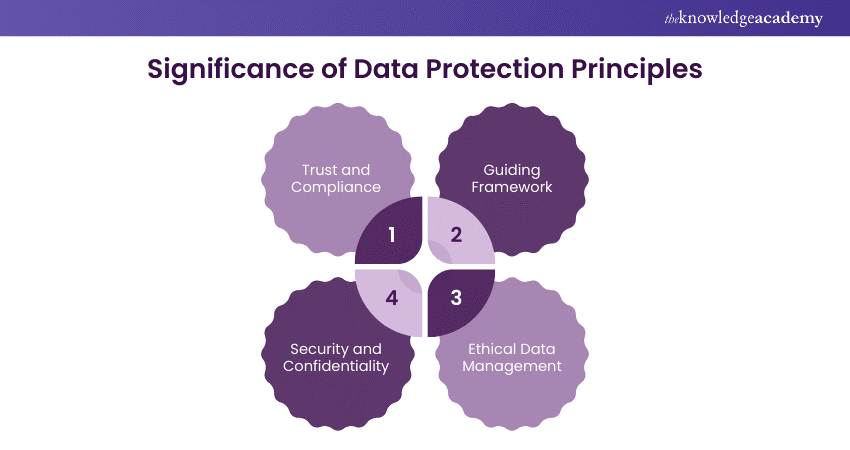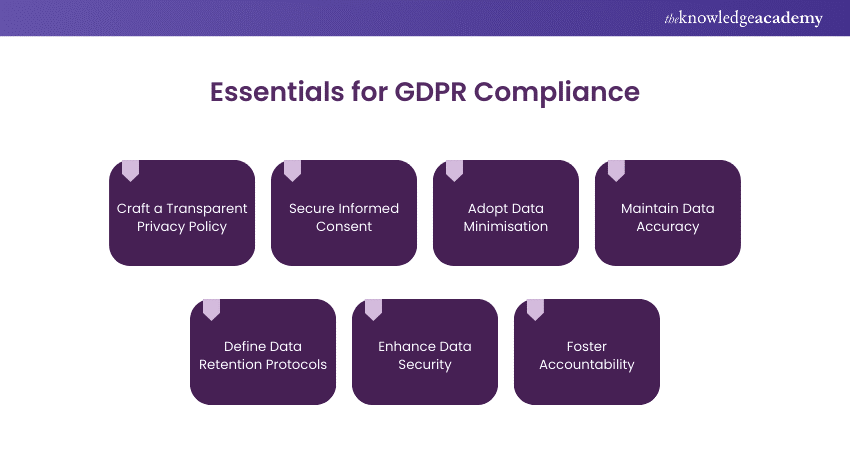We may not have the course you’re looking for. If you enquire or give us a call on +358 942454206 and speak to our training experts, we may still be able to help with your training requirements.
We ensure quality, budget-alignment, and timely delivery by our expert instructors.

Diving into the GDPR Structure is akin to exploring a vast legal ecosystem that safeguards personal data. Are you fully aware of the obligations and rights that come with it? This comprehensive blog unravels the complexities of this structure, providing a clear roadmap through its extensive regulatory network.
Curious about how GDPR impacts your business and what actions you need to take? This blog is packed with insights and tips that will help you confidently tackle the GDPR’s requirements.
Join us on this enlightening journey through the GDPR Structure. Discover how it can turn challenging tasks into opportunities for your organisation’s growth and enhance trust with your customers and partners.
Table of Contents
1) Understanding GDPR Structure
2) Detailed Overview of Data Protection Principles
3) The Importance of Data Protection Principles
4) Legal Framework of the GDPR
5) Data Protection with Cloudian Secure Storage Solutions
6) Best Practices for Adhering to GDPR Data Protection Principles
7) Conclusion
Understanding GDPR Structure
The General Data Protection Regulation (GDPR) establishes a strong framework for protecting the personal information of individuals within the European Union (EU) and the European Economic Area (EEA). Enacted by the EU in 2016, the GDPR stands as a significant legislative milestone, superseding the 1995 Data Protection Directive.
It comprises a comprehensive set of regulations articulated across 99 articles and 173 recitals, which provide interpretative guidance on the articles’ application. Grasping the GDPR’s Structure is essential for ensuring compliance and managing data effectively.
GDPR Articles
The GDPR is structured into a series of articles that outline the rights and obligations related to the handling of personal data. These articles cover various subjects, including the lawful reasons for processing data, the roles of data controllers and processors, and the mechanisms for enforcement and penalties.
To aid in understanding and following GDPR rules, the 99 articles are grouped into 11 chapters, each focusing on different stakeholders such as Data Controllers, Processors, and Data Protection Officers. These chapters are designed to provide clear guidance on compliance.
a) General Provisions
b) Principles
c) Rights of Data Subject
d) Controller & Processor
e) Transfers of Personal Data to Third Countries or International Organisations
f) Independent Supervisory Authorities
g) Cooperation & Consistency
h) Remedies, Liability & Penalties
i) Provisions Relating to Specific Processing Situations
j) Delegated Acts and Implementing Acts
k) Final Provisions
GDPR Principles
Central to the GDPR are its core principles, which dictate the handling of personal data. Here’s an in-depth look at its comprehensive principles:
|
GDPR Principles |
Description of GDPR Principles |
|
Legality, Transparency, & Fairness Principle |
Process data lawfully, fairly, and transparently under GDPR |
|
Purpose Limitation Principle |
Collect only essential data with explicit purposes |
|
Minimisation Principle |
Collect minimal data for processing |
|
Accuracy Principle |
Ensure data accuracy and rectify inaccuracies promptly |
|
Storage Limitation Principle |
Store identifiable data for the necessary duration |
|
Integrity & Confidentiality Principle |
Maintain data security to prevent unlawful access or damage |
|
Accountability Principle |
Controllers are accountable for GDPR compliance |
Protect sensitive information and safeguard privacy rights with our GDPR Awareness Training - sign up now!
Detailed Overview of Data Protection Principles
The detailed overview of Data Protection principles under the GDPR provides a comprehensive understanding of how organisations should handle personal data responsibly.
Each principle serves as a guiding framework to guarantee that personal data is processed fairly, lawfully, and transparently. Here are some of those principles:
Limitations on Storage
Limitations on storage dictate that personal data should not be retained longer than necessary for the purpose for which it was collected. Organisations must establish data retention policies that specify the duration for which personal data can be stored and outline procedures for securely deleting or anonymising data once it is no longer needed.
Ensuring Integrity and Confidentiality
Ensuring the integrity and confidentiality of personal data is essential to prevent unauthorised access, disclosure, or alteration. Organisations must implement organisational and technical measures, that include encryption and access controls. All of which can safeguard personal data against threats and vulnerabilities.
Principle of Accountability
The principle of accountability emphasises the importance of demonstrating compliance with GDPR requirements. Organisations must implement appropriate measures to ensure compliance. Those measures might include conducting Data Protection impact assessments and appointing a Data Protection Officer wherever necessary.
Principles of Lawfulness, Fairness, and Transparency
Data processing need to be lawful, fair, and transparent, with individuals being informed of the purposes for which their data is being processed and their rights in relation to their personal data. Organisations must have a legal basis for processing personal data and ensure that processing activities are conducted in a way that respects individuals' interests and rights.
Principle of Data Minimisation
The principle of Data Minimisation stipulates that organisations should only collect and process personal data that is necessary for the intended purpose. Organisations must avoid collecting excessive or irrelevant data and implement measures to anonymise or pseudonymise personal data where possible to reduce the risks associated with processing.
Ensuring Accuracy
Ensuring the accuracy of personal data is necessary to maintain its integrity and reliability. Organisations need to take reasonable steps to guarantee that personal data is accurate and up-to-date, and include implementing procedures for data validation, rectification, and erasure where necessary.
Principle of Purpose Limitation
The purpose limitation principle necessitates personal data to be processed for explicit, specified, and legitimate purposes. Organisations must ensure that personal data is not processed in a way, which is incompatible with the purposes for which it was collected. They should also obtain consent or establish a legal basis for any additional processing activities.
Understand Data Protection and implement EU GDPR compliant programs by signing up for GDPR Training now!
The Importance of Data Protection Principles
The foundational principles of the GDPR are integral to the regulation. Positioned at the forefront of the legislation, they shape all subsequent provisions. Rather than setting out rigid rules, they encapsulate the spirit of the Data Protection framework.

Adherence to these fundamental principles is a critical cornerstone for robust Data Protection practices and is vital for meeting the requirements of the GDPR’s specific provisions. Non-compliance with these principles can expose your organisation to significant penalties.
Under the GDPR, violations of the principles governing the processing of personal data can result in penalties, including fines amounting to up to 4% of the organisation’s total global annual revenue.
Join our comprehensive Dealing With Subject Access Requests (SAR) Course - sign up now to navigate SARs confidently!
Legal Framework of the GDPR
The GDPR extends beyond its 99 articles, being part of a larger legal framework that ranges from European treaties to national legislation and regulatory guidelines. A comprehensive grasp of this legal context is crucial for effectively navigating the GDPR and appreciating its overarching objectives.
Data Protection with Cloudian Secure Storage Solutions
Cloudian offers secure storage solutions that align with the Data Protection requirements of the GDPR. These solutions provide robust measures to safeguard personal data, ensuring confidentiality, integrity, and availability.
Cloudian's secure storage solutions utilise advanced encryption tactics to safeguard data in transit and at rest. Encryption ensures that even if data is intercepted or compromised, it remains unintelligible to unauthorised parties, maintaining confidentiality. Additionally, access controls and authentication mechanisms are implemented to restrict access to personal data.
They also ensure that only authorised users can view or modify sensitive information. Furthermore, Cloudian's secure storage solutions facilitate compliance with GDPR requirements regarding data retention and erasure.
Elevate your career and safeguard sensitive information with our comprehensive Certified Data Protection Officer (CDPO) Course!
Best Practices for Adhering to GDPR Data Protection Principles
While the task of complying with GDPR Data Protection principles may appear challenging, organisations can achieve compliance through meticulous planning and execution. Consider these refined best practices:

a) Clearly state what personal data you collect, its use, and how individuals can exercise their rights.
b) Obtain clear, informed consent for data processing, detailing how the data will be used.
c) Collect only essential data and regularly clean your databases of unnecessary information.
d) Regularly update personal data and allow individuals to make corrections
e) Define how long it takes to keep data and delete it when it’s no longer needed
f) Protect data with strong security measures and update them against emerging threats.
g) Embed a culture of data protection, educate your team on GDPR, and maintain records to prove compliance.
Conclusion
We trust that this blog has equipped you with the necessary knowledge to confidently tackle the GDPR’s complexities. Understanding the GDPR goes beyond mere compliance; it’s about cultivating a privacy-centric culture. Let the GDPR Structure be your guide to creating a robust and transparent approach to data protection.
Elevate your data privacy expertise with our comprehensive Data Privacy Awareness Course - book your spot now!
Frequently Asked Questions
What are the 10 Crucial Requirements of GDPR?

The 10 key requirements of GDPR include obtaining consent for data processing, appointing a Data Protection Officer (DPO), ensuring data security measures, and facilitating data subject rights. It also includes conducting Data Protection impact assessments and implementing data breach notification procedures, among others.
What are the key Sections of GDPR?

The key sections of GDPR encompass definitions, principles relating to personal data processing, data subject rights, obligations of data controllers and processors, cross-border data transfers, supervisory authorities, and enforcement mechanisms, delineating a comprehensive framework for Data Protection regulation.
What are the Other Resources and Offers provided by The Knowledge Academy?

The Knowledge Academy takes global learning to new heights, offering over 3,000 online courses across 490+ locations in 190+ countries. This expansive reach ensures accessibility and convenience for learners worldwide.
Alongside our diverse Online Course Catalogue, encompassing 19 major categories, we go the extra mile by providing a plethora of free educational Online Resources like News updates, Blogs, videos, webinars, and interview questions. Tailoring learning experiences further, professionals can maximise value with customisable Course Bundles of TKA.
What is The Knowledge Pass, and How Does it Work?

The Knowledge Academy’s Knowledge Pass, a prepaid voucher, adds another layer of flexibility, allowing course bookings over a 12-month period. Join us on a journey where education knows no bounds.
What are Related Courses and Blogs Provided by The Knowledge Academy?

The Knowledge Academy offers various GDPR Trainings, including the GDPR Awareness Training, Data Privacy Awareness Course, and Personal Data Protection Bill Training. These courses cater to different skill levels, providing comprehensive insights into GDPR Roles.
Our IT Security & Data Protection Blogs cover a range of topics related to GDPR, offering valuable resources, best practices, and industry insights. Whether you are a beginner or looking to advance your IT Security & Data Protection skills, The Knowledge Academy's diverse courses and informative blogs have got you covered.
Upcoming IT Security & Data Protection Resources Batches & Dates
Date
 Certified Data Protection Officer (CDPO)
Certified Data Protection Officer (CDPO)
Fri 14th Mar 2025
Fri 9th May 2025
Fri 11th Jul 2025
Fri 12th Sep 2025
Fri 14th Nov 2025






 Top Rated Course
Top Rated Course



 If you wish to make any changes to your course, please
If you wish to make any changes to your course, please


